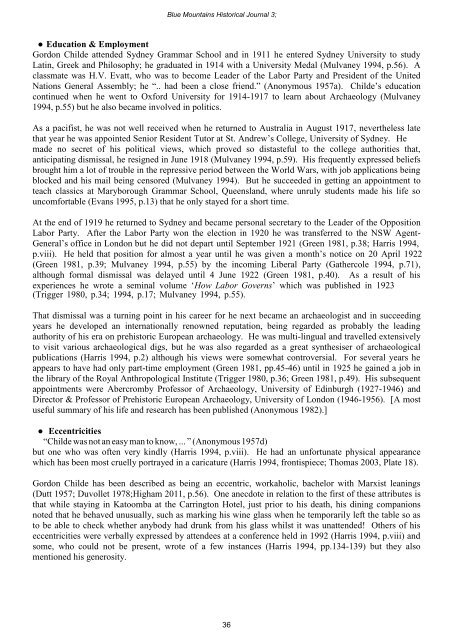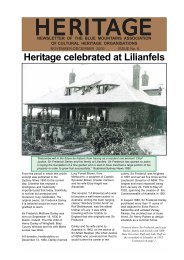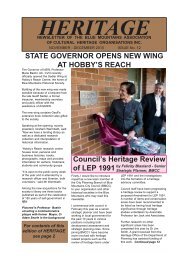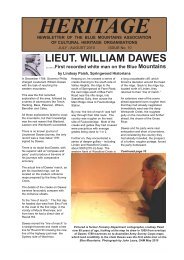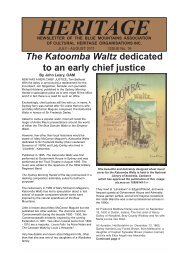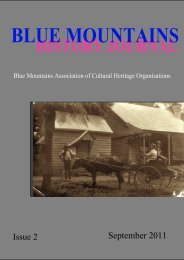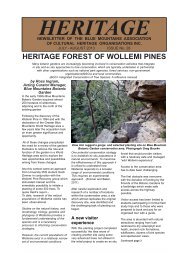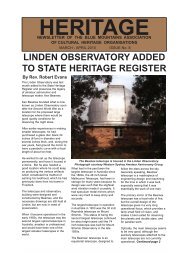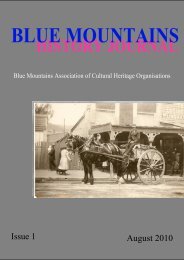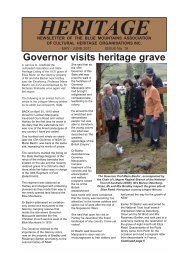Blue Mountains History Journal Issue 3
Blue Mountains History Journal Issue 3
Blue Mountains History Journal Issue 3
Create successful ePaper yourself
Turn your PDF publications into a flip-book with our unique Google optimized e-Paper software.
<strong>Blue</strong> <strong>Mountains</strong> Historical <strong>Journal</strong> 3;<br />
● Education & Employment<br />
Gordon Childe attended Sydney Grammar School and in 1911 he entered Sydney University to study<br />
Latin, Greek and Philosophy; he graduated in 1914 with a University Medal (Mulvaney 1994, p.56). A<br />
classmate was H.V. Evatt, who was to become Leader of the Labor Party and President of the United<br />
Nations General Assembly; he “.. had been a close friend.” (Anonymous 1957a). Childe’s education<br />
continued when he went to Oxford University for 1914-1917 to learn about Archaeology (Mulvaney<br />
1994, p.55) but he also became involved in politics.<br />
As a pacifist, he was not well received when he returned to Australia in August 1917, nevertheless late<br />
that year he was appointed Senior Resident Tutor at St. Andrew’s College, University of Sydney. He<br />
made no secret of his political views, which proved so distasteful to the college authorities that,<br />
anticipating dismissal, he resigned in June 1918 (Mulvaney 1994, p.59). His frequently expressed beliefs<br />
brought him a lot of trouble in the repressive period between the World Wars, with job applications being<br />
blocked and his mail being censored (Mulvaney 1994). But he succeeded in getting an appointment to<br />
teach classics at Maryborough Grammar School, Queensland, where unruly students made his life so<br />
uncomfortable (Evans 1995, p.13) that he only stayed for a short time.<br />
At the end of 1919 he returned to Sydney and became personal secretary to the Leader of the Opposition<br />
Labor Party. After the Labor Party won the election in 1920 he was transferred to the NSW Agent-<br />
General’s office in London but he did not depart until September 1921 (Green 1981, p.38; Harris 1994,<br />
p.viii). He held that position for almost a year until he was given a month’s notice on 20 April 1922<br />
(Green 1981, p.39; Mulvaney 1994, p.55) by the incoming Liberal Party (Gathercole 1994, p.71),<br />
although formal dismissal was delayed until 4 June 1922 (Green 1981, p.40). As a result of his<br />
experiences he wrote a seminal volume ‘How Labor Governs’ which was published in 1923<br />
(Trigger 1980, p.34; 1994, p.17; Mulvaney 1994, p.55).<br />
That dismissal was a turning point in his career for he next became an archaeologist and in succeeding<br />
years he developed an internationally renowned reputation, being regarded as probably the leading<br />
authority of his era on prehistoric European archaeology. He was multi-lingual and travelled extensively<br />
to visit various archaeological digs, but he was also regarded as a great synthesiser of archaeological<br />
publications (Harris 1994, p.2) although his views were somewhat controversial. For several years he<br />
appears to have had only part-time employment (Green 1981, pp.45-46) until in 1925 he gained a job in<br />
the library of the Royal Anthropological Institute (Trigger 1980, p.36; Green 1981, p.49). His subsequent<br />
appointments were Abercromby Professor of Archaeology, University of Edinburgh (1927-1946) and<br />
Director & Professor of Prehistoric European Archaeology, University of London (1946-1956). [A most<br />
useful summary of his life and research has been published (Anonymous 1982).]<br />
● Eccentricities<br />
“Childe was not an easy man to know, ... ” (Anonymous 1957d)<br />
but one who was often very kindly (Harris 1994, p.viii). He had an unfortunate physical appearance<br />
which has been most cruelly portrayed in a caricature (Harris 1994, frontispiece; Thomas 2003, Plate 18).<br />
Gordon Childe has been described as being an eccentric, workaholic, bachelor with Marxist leanings<br />
(Dutt 1957; Duvollet 1978;Higham 2011, p.56). One anecdote in relation to the first of these attributes is<br />
that while staying in Katoomba at the Carrington Hotel, just prior to his death, his dining companions<br />
noted that he behaved unusually, such as marking his wine glass when he temporarily left the table so as<br />
to be able to check whether anybody had drunk from his glass whilst it was unattended! Others of his<br />
eccentricities were verbally expressed by attendees at a conference held in 1992 (Harris 1994, p.viii) and<br />
some, who could not be present, wrote of a few instances (Harris 1994, pp.134-139) but they also<br />
mentioned his generosity.<br />
36


